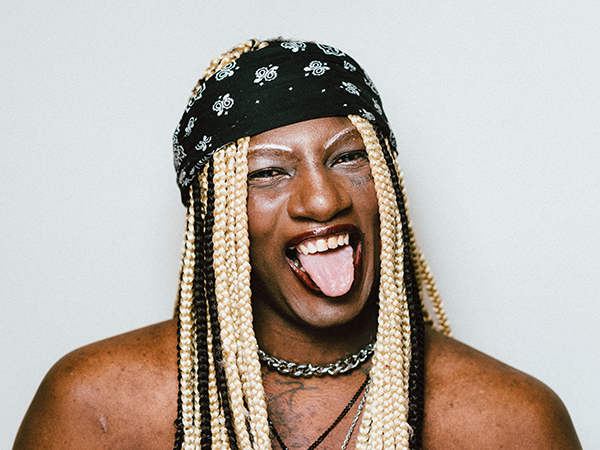BACKXWASH w/Janette King
Thu Oct 24, 8:30pm
The Carleton, 1685 Argyle Street
free
A shanti Mutinta—AKA the rapper BACKXWASH—fills the phone line with incandescent laugher, ready to soften the moment and appreciate a joke. She fills her songs with audio snippets from Mean Girls and Britney Spears samples, a cotton candy cloud foundation for infectious ear worms. Simply put, she's as bubbly as a glass of Coca-Cola.
Until the rapper picks up the mic. Then, her rhymes let rip, lacerating your eardrums with a rawness that channels the likes of Chuck D or DMX. "The ancestors and spirits take over anytime I'm rapping, sometimes it feels like a different person as well," she explains of the stark transition, molded by her come-up through the ranks of battle rapping in Montreal. "Creating a space for oppressed people to freely express their rage: I think that would describe it."
Her music imagines a world where colonialism's long shadow didn't stunt the gender spectrum into a binary, where western missionaries didn't attempt to contain African spiritualism and culture as witchcraft—basically, a world where she could be her self—all while throwing up a middle finger: "Deuteronomy, chapter two verse five, says a man shall not wear women's clothes/and I'm reading this with a dress on/I'm kinda like Jesus, I'm teflon," she raps on the scorched-earth "HETERONOMY," channelling Illmatic-era Nas in her raspy tone.
"I like to say sometimes anger is a very underrated emotion, I think we should embrace it and not stay away from it. We spend so many years and such a long time of people telling you to turn the other cheek and hug them and just like, no," Mutinta adds. "Some of these oppressive structures need to be stepped on and punched in the face."
"I ask myself where would I have gone with my identity if my Christian parents hadn't been like 'Hey, stop that'—because when I was growing up, I was very fluid in my gender expression until people noticed and were like 'Nope, we don't want that'," she continues. "And I always ask myself: If it was open and it went back to the time when tribes in Africa had gender expression—I think I would have expressed myself very differently."
But, "I'm not just taking up space but I'm also having fun: I always intended for the music to sound, you know, fun," she says, before the line erupts in her laugh again. "Going back to Chuck D saying 'Fight the power' or NWA saying 'Fuck the police': Those songs are so, like, there's a total message here, but they're fun."
Both legendary protest MCs clearly influence Mutinta, an obsessive study of her genre. When it comes to crafting a song, speed is essential—another old-school hip hop holdover she carries: "The first thing I like to figure out is the hook and if I can't figure out the hook in like, five minutes, then I'm probably not gonna write the song, I'm probably gonna scrap it," she says.
"When I used to listen to 50 Cent growing up, 50 Cent said the hook is the most important part when you're writing the song, because it comes in a lot and you need to make sure it is the catchiest part. I used to wonder why 50 Cent songs left such lasting impressions and it's because of the hook thing," she adds. "And the hook will make it more fun as well, so I try to put that element in so it'll be not too heavy but aggressive and fun," she says, making her own twist on the combo that made Mean Girls so great: Glitter and gall.

